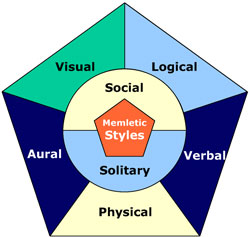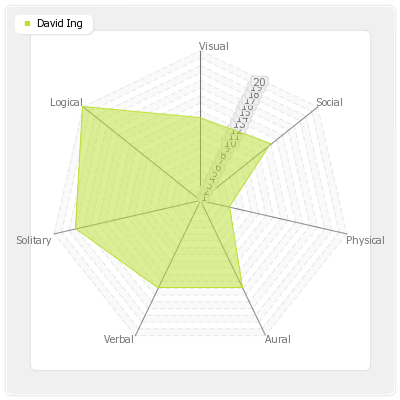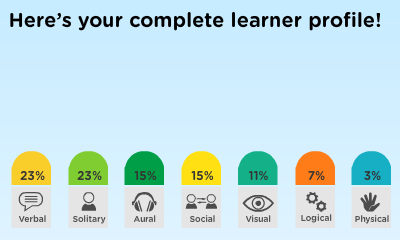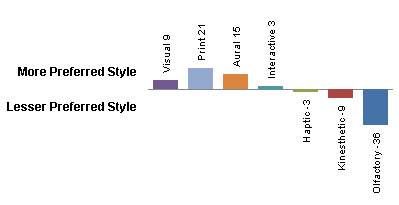Sean Whiteley synthesized the Memletics (Learning) Styles from two brain models: Multiple Intelligences (from Howard Gardner) and the Visual-Auditory-Kinesthetic model (derived from sensory-based modes from NLP).
The Memletics Learning Styles Questionnaire on http://learning-styles-online.com is cited as created in 2004, based on the Memletics Accelerated Learning Manual, by Sean Whiteley (Advanogy, 2003). With neither memletics.com nor advanogy.com domains currently online, the ebook has been reproduced on scribd.com by Maria McConkey. Whiteley bases his model on “brain regions”.

… we first look at the basis of learning styles and their influence on learning. [….] We then look at each of the Memletic Styles in turn. In summary, these are:
- Visual. You prefer using pictures, images, and spatial understanding.
- Aural. You prefer using sound and music.
- Verbal. You prefer using words, both in speech and writing.
- Physical. You prefer using your body, hands and sense of touch.
- Logical. You prefer using logic, reasoning and systems.
- Social. You prefer to learn in groups or with other people.
- Solitary. You prefer to work alone and use self-study.
Lastly, we look at how you can improve your learning by using learning styles. One obvious way is to use more of your dominant learning styles. An interesting feature of learning styles is that you can also improve your learning performance by using styles you do not often use. If you are a mainly visual person, then you can make a lesson more memorable by using some aural content in your visualizations. If you like to use logic, then use some physical learning techniques occasionally.
Why Styles? Understand the basis of learning styles
Your learning styles have more influence than you may realize. Your preferred styles guide the way you learn. They also change the way you internally represent experiences, the way you recall information, and even the words you choose. We explore more of these features in this chapter. Research shows us that each learning style uses different parts of the brain. By involving more of the brain during learning, we remember more of what we learn. Researchers using brain-imaging technologies have been able to find out the key areas of the brain responsible for each learning style. Refer to the “Brain Regions” diagram and read the following overview:
- Visual. The occipital lobes at the back of the brain manage the visual sense. Both the occipital and parietal lobes manage spatial orientation.
- Aural. The temporal lobes handle aural content. The right temporal lobe is especially important for music.
- Verbal. The temporal and frontal lobes, especially two specialized areas called Broca’s and Wernicke’s areas (in the left hemisphere of these two lobes).
- Physical. The cerebellum and the motor cortex (at the back of the frontal lobe) handle much of our physical movement.
- Logical. The parietal lobes, especially the left side, drive our logical thinking.
- Social. The frontal and temporal lobes handle much of our social activities. The limbic system (not shown apart from the hippocampus) also influences both the social and solitary styles. The limbic system has a lot to do with emotions, moods and aggression.
- Solitary. The frontal and parietal lobes, and the limbic system, are also active with this style.
I’ve based the Memletic Styles on two brain models you may have heard about. The first is “Multiple Intelligences” by Howard Gardner. I’ve broadened his model and made it more applicable to learning. You may know the other model as “VAK,” or the Visual-Auditory-Kinesthetic model. Neuro-Linguistic Programming (NLP) books also describe this model as “modality preferences”.
Source: Sean Whiteley, Memletics Accelerated Learning Manual (2003), pp. 55-56.
As much as I would like to follow up on continuing research, the last mention that I can find about Memletics is a cached version on archive.org from 2008.
My learning styles inventory as assessed from http://learning-styles-online.com sees my highest scores as logical and solitary. However, a closer interpretation says (i) logical, aural and verbal dominate over visual (slightly) and physical (completely), and (ii) solitary is preferred (but may not dominate) over social. If I am to have a learning style that includes listening and talking, I would expect that to happen socially!
There’s a glitzier Flash-based Education Nation Learner Profile Assessment hosted by the University of Phoenix using the same seven categories as Memletics. The 21 questions are phrased differently (shorter than 70 by Memletics), and the research sources is not cited, so the validity of this assessment seems weaker. The primacy of verbal and aural over logical doesn’t feel right.
In the Perceptual Modality Preference Survey on learningstyles.org, I sense information most as a print learner and a aural (listening) learner. I’m unlikely to learn by smelling or sniffing.
The C.I.T.E. Learning Styles Instrument from the Center for Innovative Teaching Experiences at the Murdoch Teachers Center in Wichita, Kansas, based on (Babich, Burdine, Albright, and Randol, 1976) had better academic source (pre-Howard Gardner), but is available only administered on paper, and not electronically. A thesis by L. Harden (University of South Florida, 1992) says “use of the CITE learning style instrument … should be discontinued since no positive correlations were found with this instrument”.
Along the way, I noticed a description of learning strategies (not styles) as serialist or holist, originating from Gordon Pask, described by James Atherton as (2011) at http://www.learningandteaching.info/learning/pask.htm .
The controversy over learning styles as a topic is well described by Guy W. Wallace, “Why Is the Research on Learning Styles Still Being Dismissed by Some Learning Leaders and Practitioners?”, November 2011, ACM eLearn Magazine at http://elearnmag.acm.org/featured.cfm?aid=2070611.





